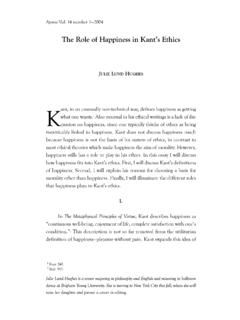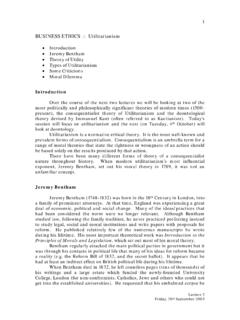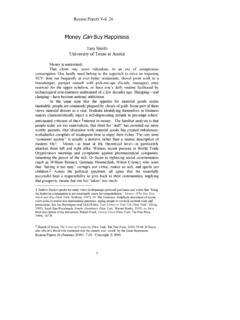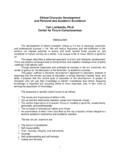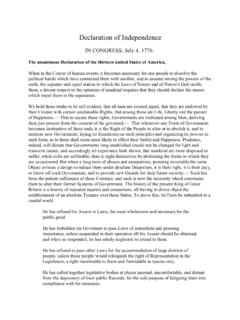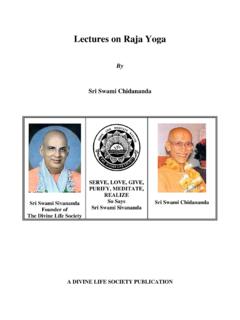Transcription of The Role of Happiness in Kant’s Ethics - Aporia
1 Kant, in an unusually non-technical way, defines Happiness as gettingwhat one unusual in his ethical writings is a lack of dis-cussion on Happiness , since one typically thinks of Ethics as beinginextricably linked to Happiness . Kant does not discuss Happiness muchbecause Happiness is not the basis of his system of Ethics , in contrast tomost ethical theories which make Happiness the aim of morality. However, Happiness stills has a role to play in his Ethics . In this essay I will discusshow Happiness fits into Kant s Ethics . First, I will discuss Kant s definitionsof Happiness .
2 Second, I will explain his reasons for choosing a basis formorality other than Happiness . Finally, I will illuminate the different rolesthat Happiness plays in Kant s The Metaphysical Principles of Virtue, Kant describes Happiness as continuous well-being, enjoyment of life, complete satisfaction with one scondition. 2 This description is not so far removed from the utilitariandefinition of Happiness pleasure without pain. Kant expands this idea ofAporiaVol. 14 number 1 2004 The Role of Happiness in Kant s EthicsJULIELUNDHUGHESJ ulie Lund Hughes is a senior majoring in philosophy and English and minoring in ballroomdance at Brigham Young University.
3 She is moving to New York City this fall, where she willraise her daughter and pursue a career in to include power, riches, honor, even health and that completewell-being and satisfaction with one s condition. 3 Kant refers to man spreservation and welfare as synonymous with his calls hap-piness the complete satisfaction of all one s needs and theCritique of Practical Reason, Kant defines Happiness as the state of arational being in the world in the whole of whose existence everything goesaccording to his wish and will. 6 Happiness is not pleasure. It is not the virtu-ous, joyful feeling associated with living a moral life.
4 Happiness is simplygetting what you want. As Warner A. Wick puts it, Happiness lies in thefulfillment of whatever [a person s] many interests happen to be. 7It isimportant to keep Kant s definition of Happiness in mind when readinghis of the way Kant defines Happiness , one can immediately seesome reasons for its powerlessness to function as a basis of morality. First,getting what one wants might mean preventing others from getting whatthey want, so it seems to be difficult, if not impossible, for everyone to behappy. Thus, if morality is defined in terms of Happiness , not everyone canbe moral, which seems wrong.
5 This problem arises whenever one seeks todefine morality in terms of Happiness . The fact that not everyone could bemoral if not everyone could be happy follows from the contrapositive ofthe conditional statement, If you are moral, you are happy, which is whathappiness-based moral systems like Eudaimonismprofess. There is another problem with basing morality on Happiness : itappears that people do not know for certain what will make them writes, The concept of Happiness is such an indeterminate concept62 JULIELUNDHUGHES3 Ibid. , although every human being wishes to attain this, he can still neversay determinately and consistently with himself what he really wishes andwills.
6 8 Kant gives the example of someone who seeks after riches becausehe thinks it will make him happy, only to find that his pursuit actuallyresults in unhappiness, because of the anxiety, envy, and intrigue that comewith it. Another example is someone who seeks after knowledge, only todiscover many dreadful things that had previously been concealed finite beings, we cannot know which actions will result in happi-ness, for this would require best one can do is to live bywords of wisdom extracted from one s experience, such as frugality, cour-tesy, reserve and so forth, in an attempt to be bluntly states, The problem of determining surely and universally which action wouldpromote the Happiness of a rational being is completely insoluble.
7 12 Thisis the case because Happiness is not an ideal of reason but of imagina-tion. 13 This inability to choose actions that will undoubtedly result in hap-piness leads Kant to the following: The more a cultivated reason pur-posely occupies itself with the enjoyment of life and with Happiness , somuch the further does one get away from true satisfaction. 14 That is, seek-ing for Happiness will not result in finding Happiness . For this reason, Kantsays that Happiness cannot be the moral purpose of rational beings If it were, instinct would be more efficient than reason in bringinghappiness about, because we use instinct to fulfill our thisscenario, reason would have no practical use, but would only be used to63 ROLE OFHAPPINESS INKANT SETHICS8 Kant says that Happiness is unquestionably a purpose of all rational beings, but it is notthe end ofmorality.
8 See Ibid. 50 and delight in the Happiness that instinct was able to , Kant claims that the true vocation of reason must be to pro-duce a will that is good. 18 And producing a good will, in fact, limitstheattainment of Happiness in many moral principle of one s own Happiness is false for three morereasons, according to Kant. First, experience contradicts the pretense thatwell-being always proportions itself to good conduct. 20It is false that doingthe right thing always results in Happiness , as the doctrine of happinessstates. In fact, morality often flies in the face of Happiness by denying theattainment of one s desires.
9 Second, it contributes nothing at all to theestablishment of morality, since making someone happy is quite differentfrom making him good. 21 Many people fulfill their inclinations (and so arehappy) without being moral. Kant writes, Every admixture of incentivestaken from one s own Happiness is a hindrance to providing the moral lawwith influence on the human heart. 22 Thus, seeking Happiness often pre-vents morality. On the other hand, one can be moral without being happy,since one cannot count on other people to be moral, nor can one count onnature bringing good fortune. The third and most important reason theprinciple of Happiness is false is that it bases morality on incentives thatundermine [morality] and destroy all its sublimity.
10 23 Kant writes that theprinciple of Happiness tells virtue to her face that it is not her beauty butonly our advantage that attaches us to her. 24 This, Kant thinks, is clearlywrong. These are all legitimate problems with moral theories based on hap-piness, but the essential problem is even more fundamental. Kant drawsthe following distinction between the doctrine of Happiness and the doc-64 JULIELUNDHUGHES17 Ibid. of morals: In the first of which empirical principles constitute thewhole foundation whereas in the second they do not make even the slight-est addition to it.
